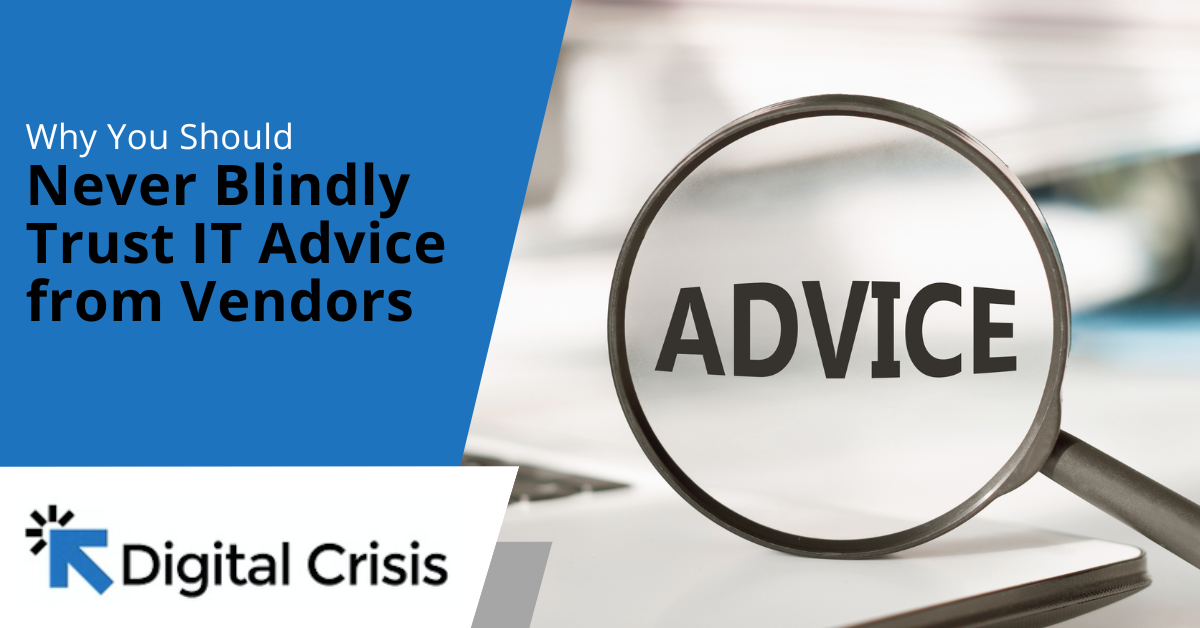In today’s digitally-driven world, businesses heavily rely on technology to streamline operations, improve productivity, and gain a competitive edge. As a result, organizations often seek assistance from vendors for a range of IT solutions, software integrations, and system maintenance.
While vendors play a crucial role in meeting these technological needs, it is imperative to exercise caution when it comes to blindly following their advice.
This article aims to delve deeper into the reasons why you should never unquestioningly accept IT advice from vendors, particularly in situations where they request you to open ports, allow programs to run as administrators, or make other potentially risky decisions.
What is the Role of Vendors?
Vendors, whether they offer software, hardware, or IT services, are primarily focused on their products and offerings. While they possess knowledge and expertise in their respective domains, it is important to remember that their primary objective is to sell and promote their products. Consequently, their advice may not always align with your organization’s best interests or broader IT security considerations.
The Perils of Opening Ports
One common scenario where vendors may recommend opening ports on your network is for remote access or software updates. Although it may appear harmless, granting access by opening ports can expose your organization to significant security risks.
Open ports serve as potential entry points for cybercriminals, increasing the likelihood of unauthorized access, data breaches, and compromise of your network infrastructure. By blindly complying with a vendor’s request, you might inadvertently weaken your network security posture and expose sensitive information to malicious actors.
The Dangers of Running Programs as Administrators
Another area where vendors may provide questionable advice is in suggesting running programs with administrative privileges. While this approach may be necessary in certain cases for compatibility or installation purposes, it should be approached with extreme caution.
Granting administrative privileges to programs provides them with elevated access and control over your system. If a program is compromised or contains malicious code, it can wreak havoc on your network, compromise sensitive data, and potentially grant unauthorized access to other parts of your infrastructure.
Vendor Bias and Limited Perspective
Vendors inherently possess a bias towards their own products and services. Consequently, they may prioritize pushing their solutions without considering the full range of options available in the market.
Relying solely on their advice can limit your organization’s ability to explore alternative, potentially better-suited solutions that align with your unique requirements. It is essential to approach vendor recommendations with a critical mindset and conduct independent research to ensure you make informed decisions based on your organization’s needs.
The Value of an Independent IT Consultant
To navigate the complexities of modern IT environments, organizations can greatly benefit from the guidance of an independent IT consultant. Unlike vendors, independent consultants offer impartial advice based on a comprehensive understanding of your organization’s requirements, industry best practices, and the evolving IT landscape.
They can assess your specific needs, evaluate different vendors and solutions objectively, and help you make informed decisions that prioritize both security and operational efficiency. Collaborating with an independent IT consultant can provide valuable insights and ensure that you are not limited by vendor bias or narrow perspectives.
Establishing Internal IT Expertise
Building internal IT expertise within your organization is another crucial step towards reducing reliance on vendor advice. By nurturing an in-house IT team or partnering with managed service providers who possess a deep understanding of your business, you gain better control over your technology infrastructure.
Your internal IT professionals can serve as knowledgeable filters, evaluating vendor advice critically and aligning it with your overall IT strategy and security framework. This internal expertise empowers you to make informed decisions, safeguard your systems and data, and enhance your organization’s long-term growth prospects.
Level Up Your Cybersecurity Today
While vendors play a crucial role in the realm of IT, blindly following their advice can expose your organization to significant risks. It is essential to approach vendor recommendations with a critical mindset, conduct independent research, and prioritize your organization’s specific requirements and security considerations.
Engaging an independent IT consultant and fostering internal IT expertise are effective strategies to mitigate risks, make informed decisions, and protect your organization’s IT infrastructure, data, and future growth.
For expert guidance on IT decision-making, security assessments, and unbiased technology recommendations, contact Digital Crisis. Our team of experienced IT consultants will work closely with your organization to understand your unique needs, evaluate potential solutions, and help you make informed choices that align with your business goals. Safeguard your IT infrastructure and unlock the full potential of technology with our trusted IT consultancy services today!
